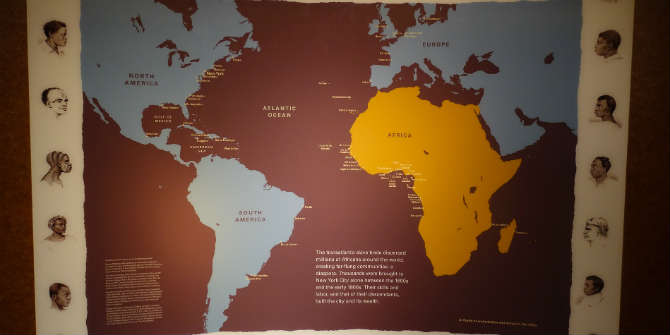Maria Berta Ecija says this book contributes greatly to the conceptualisation of security, prestige, humanitarianism, conflict, and economic motivation.
This is one of those books that makes you want to rethink about anarchy, realism, and to contest the role of institutions in humanitarian issues. It reminds us not to be too optimistic about world politics and always look at potential gains behind altruistic actions.
Dr Catherine Gegout is an Associate Professor in the International Relations Department at the University of Nottingham. Her area of expertise apart from international relations theories relies on European Studies. Her area of expertise is foreign policy, security and intervention. In this book, she looks at the reasons behind European intervention in the African continent, between 1980 to 2016. This timeframe marks a period of transition that includes the end of colonialism, the collapse of the Soviet Block during the Cold War, the transition to liberal democracies, and globalization.
In terms of structure, the book is divided into eight chapters. The first two are mainly theoretical and focused on the historical background. The third gives a global perspective about interventions in the continent- by global, she means the UN, China and the United States. Chapter four and five can be understood as case studies, where the author looks specifically at the United Kingdom and France. Followed by the last two chapters, which aim is to understand the role of the European Union in the issues of intervention, followed by an evaluation of past and future perspectives.
Four leading questions are followed throughout the book: “Why France, United Kingdom and Europe intervene militarily in some African conflicts?”, “Do European leaders feel responsible for people there?”, “To what extent do they really care about the wars in the African States?”, “How are their self-interest and values related to intervention?” (p.2)
While perusing the answer to such questions, Gegout stands out in two ways: 1) her methodological and theoretical approach; 2) the vast cases of intervention in Africa she manages to cover.
Gegout provides a great contribution to the conceptualization of security, prestige, intervention, humanitarianism, conflict, and economic motivation. Furthermore, throughout the book, while she exposes the cases of European intervention in Africa, she sticks to the methodological structure. In the sense that, all her chapters are introduced or concluded with the junction of the real-world context, applied to each of the theoretical frameworks. Hence my argument of this book being an essential reading if you are interested in theories of IR. Also, if you are struggling methodologically to analyse theory in face of reality, this could be a great source. It’s as if she developed a theoretical formula which can be applied in each case she mentions.

Moving to the second point, the material contains many case studies of the past 30 years, in different countries and types of intervention- military, political, economic, humanitarian, etc. Which works both ways: if you are analysing a State, you can use this book as a guiding material to see the timeline and types of interventions it suffered. Or if you are looking at it from the interventionist side, you can always use it as a consultation material to see the umbrella of interests and principles the State/Institution operated.
Nevertheless, there are some worthy points to have in mind before reading this book. The subject matter of the research was too ambitious at least to cover in one volume. In the sense that, at some points of the book, one might be caught thinking: Does Europe here consists of the United Kingdom and France? Are those countries the only ones to intervene? Is she dealing with geographical context or institutional? Or even, is it fair to label the entire continent as interventionist?
The same applies to her analysis to Africa. Although the strength of the book relies in the great number of countries she manages to study, it becomes its weakness as well. She does not have the opportunity to fully explore the events, therefore, this material is more likely to serve as an introduction and consultation, rather than to provide a complete understanding of intervention in Africa.
While her proposal was to give a complete overview of the European intervention, she focuses more on the United Kingdom and France interventions on the continent. Even when the author analyses the broader picture, such as the United Nations, United States or China intervention, there is an element of relativity and comparison with UK and France. This approach leads to two problems. First, it tends to ignore the influence of other ex-colonial powers in Africa. Therefore, I think a good complementary reading would be Patrick Chabal in A History of Postcolonial Lusophone Africa, because it helps to broaden the understanding of European intervention and legacy, by adding Lusophone perspectives into the mix.
Second, the book misses an Africanist perspective of European intervention. Therefore, I also believe Glennie’s book on The Trouble with Aid: Why Less Could Mean More for Africa (African Arguments) would add to her approach of economic realism and humanitarianism. Helping the reader to understand the impacts of intervention for African governments and people.
Overall, Gegout provides us with a provocative, critical and insightful reading about the real motives of interventions and their long-lasting impacts. It dispels the notion of European intervention as charitable or benevolent, highlighting the realpolitik behind these interventions.
Why Europe Intervenes in Africa: Security Prestige and the Legacy of Colonialism by Catherine Gegout. Hurst Publishers. 2017.
Maria Berta Ecija is a PhD Candidate at King’s College London- King’s Brazil Institute and African Leadership Centre
The views expressed in this post are those of the author and in no way reflect those of Africa at LSE blog or the London School of Economics and Political Science.





